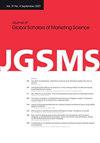Short and sweet: How product quality uncertainty, review length and richness shape review helpfulness
IF 2.7
Q3 BUSINESS
Journal of Global Scholars of Marketing Science
Pub Date : 2023-11-06
DOI:10.1080/21639159.2023.2255873
引用次数: 0
Abstract
ABSTRACTBecause online reviews facilitate consumers’ purchase decisions, prior research investigates factors impacting review helpfulness. By integrating Kuhlthau’s information search process model and the heuristic-systematic model, we propose that a situational factor – product quality uncertainty – shapes consumers’ information search processes and suggests which reviews are most helpful. The literature suggests that review length and information richness positively impact review helpfulness. However, their joint effect conditional on product quality uncertainty is unknown. An experiment reveals that consumers are motivated to process individual reviews only when uncertainty is high (i.e. when consumers disagree on product quality). Analysis of over 37,000 online reviews indicates that, under high uncertainty, short reviews with rich information are most helpful. Consistent with the experiment results, neither factor drives helpfulness when uncertainty is low (i.e. when previous consumers exhibit a consensus on product quality). We present managerial implications for stimulating “short and sweet” reviews to increase review helpfulness.KEYWORDS: Online reviewstext miningreview helpfulnessuncertaintyheuristic-systematic information processing Disclosure statementNo potential conflict of interest was reported by the author(s).Supplementary dataSupplemental data for this article can be accessed online at https://doi.org/10.1080/21639159.2023.2255873.言简意赅:如何保证产品质量的不确定性,评论的长度和丰富度塑造评论的有益性
摘要由于在线评论有助于消费者的购买决策,因此已有研究调查了影响评论有用性的因素。通过整合Kuhlthau的信息搜索过程模型和启发式系统模型,我们提出情景因素-产品质量不确定性-塑造了消费者的信息搜索过程,并建议哪些评论最有帮助。文献表明,复习长度和信息丰富度对复习有用性有正向影响。然而,它们对产品质量不确定度的共同影响是未知的。一项实验表明,只有在不确定性很高的情况下(即消费者对产品质量持不同意见),消费者才有动机处理个人评论。对37000多条在线评论的分析表明,在高度不确定的情况下,信息丰富的简短评论最有帮助。与实验结果一致,当不确定性较低时(即当以前的消费者对产品质量表现出共识时),这两个因素都不会产生帮助。我们提出了激励“短而甜”的评审以增加评审有用性的管理建议。关键词:在线评论文本挖掘评论有用性不确定性启发式系统信息处理披露声明作者未报告潜在利益冲突。本文的补充数据可以在线访问https://doi.org/10.1080/21639159.2023.2255873。
本文章由计算机程序翻译,如有差异,请以英文原文为准。
求助全文
约1分钟内获得全文
求助全文

 求助内容:
求助内容: 应助结果提醒方式:
应助结果提醒方式:


